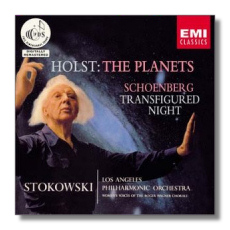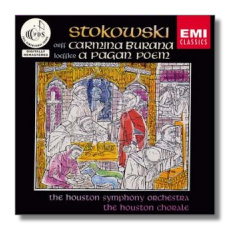
The Internet's Premier Classical Music Source
Related Links
- Latest Reviews
- More Reviews
-
By Composer
-
Collections
DVD & Blu-ray
Books
Concert Reviews
Articles/Interviews
Software
Audio
Search Amazon
Recommended Links
Site News
 CD Review
CD Review
Full Dimensional Sound

- Gustav Holst: The Planets 1
- Arnold Schoenberg: Transfigured Night 2
1 Women's Voices of the Roger Wagner Chorale
1 Los Angeles Philharmonic Orchestra/Leopold Stokowski
2 Leopold Stokowski Symphony Orchestra/Leopold Stokowski
EMI Classics 67469 ADD 75:03


- Carl Orff: Carmina Burana
- Eugene Loeffler: A Pagan Poem 3
Virginia Babikian, soprano
Clyde Hager, tenor
Guy Gardiner, baritone
Houston Chorale
Houston Youth Symphony Boys' Choir
Houston Symphony Orchestra/Leopold Stokowski
3 Leopold Stokowski Symphony Orchestra/Leopold Stokowski
EMI Classics 67569 ADD 75:56


Piotr Ilyitch Tchaikovsky
- Symphony #6 "Pathétique"
- Serenade for Strings
Pittsburgh Symphony Orchestra/William Steinberg
EMI Classics 67568 ADD monaural 75:14
These three discs are new releases in EMI Classics' Full Dimensional Sound series. All of them originally appeared on the Capitol Records label in the 1950s.
The pick of the litter is the Holst disc. When Leopold Stokowski recorded The Planets in Hollywood's Samuel Goldwyn Studios in 1956, he must have been in an unusually ebullient mood, because the pits of this CD can hardly contain the music that they encode. Quick tempos are the rule here, and listeners looking for a reading whose prominent characteristic is English dignity (for example, in the middle section of "Jupiter, the Bringer of Jollity") will need to look elsewhere. To say that Stokowski treats the work as a stereo showpiece might sound condescending, but it is not meant to be. He understands the score's potential to produce a pleasant and shiveringly visceral response, when presented with the greatest sonic allure, and he (and his engineers) act upon this understanding. There are some Stokowskian emendations – for example, the tam-tam roll at the end of "Mars, the Bringer of War" – and most of them are fairly tasteful (albeit poison to purists).
This time around, one feels that knob-twiddling had as much to do with the success of this recording as the musicians themselves. The booklet reproduces a memo written by the conductor to session producer F.M. Scott. In this memo, Stokowski makes several suggestions on how to improve the sound of the discs. These include amplifying the lows, and adding reverberation at different points in the score. This new remastering (not to be confused with EMI Classics CDM 65423, which couples the same recording with works by Ravel and Stravinsky), supposedly acts upon Stokowski's suggestions, but the differences between this CD and the previous CD remastering are not that striking. Suffice it to say that the sound is wonderful, with or without gimmickry.
The Schoenberg Transfigured Night, a Stokowski specialty, was recorded a year later in the same studios. This is another wonderful performance, very hot and bothered, although the music gets thrown around pretty heavily by the conductor. Refined it is not.
There's no stranger Carmina Burana than Stokowski's. From the opening phrase, he rewrites Orff's score to suit his flamboyant and idiosyncratic personality. The conductor's admirers (myself included) will expect no less, of course, but Orff's score is so basic that any tampering becomes shockingly obvious, like the proverbial sore thumb. Stokowski's attitude towards tempo is like the weather in Washington, D.C.: if you don't like it, stick around, because it will be different in a minute. Apparently he also has limited patience for Orff's strophic writing, because he cuts verses from some of the numbers. (I am wondering if this was done because of LP side length. However, no other recording I've heard is cut in this manner.)
Stokowski reorchestrates and recomposes Carmina Burana at will. Some of his changes are heavily mannered, such as the whopping pauses between the strophes in "Tempus est iocundum," and between phrases in the opening "O Fortuna." "Veni, Veni, Venias," instead of ending with a single held note, as written, ends with the chorus warbling melismatically between two. In the baritone's "Dies, nox et omnia," the falsetto passages are sung by the tenor – talk about a split personality! One might wonder whether Stokowski had utter contempt for Carl Orff, yet he did conduct the American première of Trionfo di Afrodite, the third work in the trilogy whose first panel is Carmina Burana.
Virginia Babikian does a lovely job with the soprano solos; her "In Trutina" is melting. Other sopranos have been more maidenly, though. Clyde Hager makes the most of his "roasted swan" song. Baritone Guy Gardner hams his solos up too: he sings "Dies, nox et omnia" as if he were on the verge of tears, which is textually accurate, but also somewhat obvious. The chorus is nothing special, particularly where diction is concerned, and the Texas tenors seem to be singing through their collective noses, which gives Orff's score a bizarrely twangy Country-and-Western quality. The 1958 recording is boomy, and not much of an audiophile delight. If you're looking for a first recording of Carmina Burana, this would clearly not be the one to get. If you like the score, however, you might find the Stokowski-ized version terribly provocative.
Charles Loeffler's 24-minute Pagan Poem gets a much less freakish recording from Stokowski, who seems right at home with its Scriabinisms. This recording was made in 1957 with the "Leopold Stokowski Symphony Orchestra" in Los Angeles. The playing is good enough, and the engineering is better, yet the final peroration does remind me of a rush hour traffic jam in New York City.
The Steinberg Tchaikovsky CD will appeal to a more narrow audience because the recordings are pre-stereophonic, and also because Steinberg's musicianship is worlds apart from Stokowski's. EMI's booklet notes tell us that it was Steinberg's "tenure at the Pittsburgh Symphony Orchestra, where he served as Music Director from 1952 to 1976, which brought him the highest degree of notoriety and respect." "Notoriety," with its negative and sensationalistic connotation, seems to be the wrong word to describe Steinberg's career, which was always solidly professional, and self-effacing in a manner that Stokowski's never was.
The "Pathétique" was recorded in 1954, and the Serenade for Strings one year earlier. These are spacious interpretations, but not self-indulgent. The music is given its emotional due without exaggeration or hysteria. In a tremendously crowded field they cannot be described as literally outstanding. Nevertheless, they are very satisfying, and they demonstrate that Steinberg's biggest fault was that he was a conductor in an era of similarly great conductors, many of them more flashy than he. The Pittsburgh Symphony Orchestra is best in the strings; wind intonation can be iffy, but the playing has personality throughout. The recording, albeit monaural, wears its nearly fifty years lightly.
Copyright © 2001, Raymond Tuttle


















